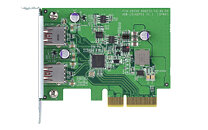Thursday, August 20th 2020

QNAP Launches USB 3.2 Gen 2 Dual-port PCIe Expansion Card for NAS and PC
QNAP Systems, Inc., a leading computing, networking and storage solution innovator, today launched the QXP-10G2U3A - a USB 3.2 Gen 2 Dual-port PCIe Expansion Card which provides speeds of up to 10 Gbps. QNAP USB 3.2 Gen 2 Expansion Cards can be installed in QNAP NAS with a PCIe slot, or Windows /Linux desktops/servers to enable faster connections to modern USB devices.
The QXP-10G2U3A includes two USB 3.2 Gen 2 Type-A ports, with each port providing up to 10 Gbps data transfer speeds. It supports the USB Attached SCSI Protocol (UASP) to facilitate fast file-sharing data transfers, uses advanced low-power processes, and follows standard PCIe/USB bus Power Management to optimize power consumption. The QXP-10G2U3A also supports overcurrent detection and short circuit protection."The QXP-10G2U3A expansion card enables transfer speeds up to twice as fast as USB 3.2 Gen 1 and up to 20 times faster than USB 2.0. This enhanced speed opens up new opportunities for NAS and PC users, including the ability to use a QNAP USB JBOD for easy storage expansion and high-speed data backup," said Jason Hsu, Product Manager of QNAP.
No driver is required to install the QXP-10G2U3A expansion card to connect to the TL-D800C and TL-R1200C-RP QNAP USB JBOD product series. QTS / QuTS hero NAS users can manage connected USB JBOD storage using Storage & Snapshots Manager; PC users via QNAP JBOD Manager.
The QXP-10G2U3A USB 3.2 Gen 2 Expansion Card is now available. For more information, visit the product page.
The QXP-10G2U3A includes two USB 3.2 Gen 2 Type-A ports, with each port providing up to 10 Gbps data transfer speeds. It supports the USB Attached SCSI Protocol (UASP) to facilitate fast file-sharing data transfers, uses advanced low-power processes, and follows standard PCIe/USB bus Power Management to optimize power consumption. The QXP-10G2U3A also supports overcurrent detection and short circuit protection."The QXP-10G2U3A expansion card enables transfer speeds up to twice as fast as USB 3.2 Gen 1 and up to 20 times faster than USB 2.0. This enhanced speed opens up new opportunities for NAS and PC users, including the ability to use a QNAP USB JBOD for easy storage expansion and high-speed data backup," said Jason Hsu, Product Manager of QNAP.
No driver is required to install the QXP-10G2U3A expansion card to connect to the TL-D800C and TL-R1200C-RP QNAP USB JBOD product series. QTS / QuTS hero NAS users can manage connected USB JBOD storage using Storage & Snapshots Manager; PC users via QNAP JBOD Manager.
The QXP-10G2U3A USB 3.2 Gen 2 Expansion Card is now available. For more information, visit the product page.




8 Comments on QNAP Launches USB 3.2 Gen 2 Dual-port PCIe Expansion Card for NAS and PC
What a great idea for a "new" expansion card....
Hello QNAP, it's 1998 calling, and we want ALL our A ports back, like, yesterday....:laugh:..:kookoo:..:twitch:
Both PCIe and USB have a decent amount of protocol overhead. With mechanical HDD easily reaching net sequential throughputs of 960Mbps (120MB/s x 8bit for easier calculations), bandwidth surely can be an issue.
So a limit of 1.0 GB/s on the PCIe bus, not enough for 10Gb (10/8=1.25).
Not having a header for case's connectors is more a deal breaker IMO.